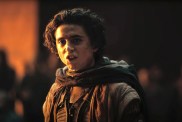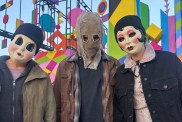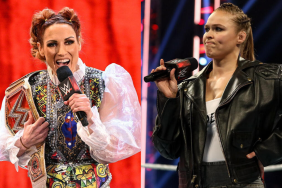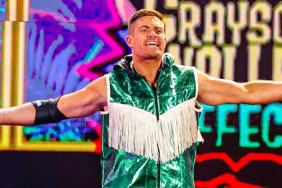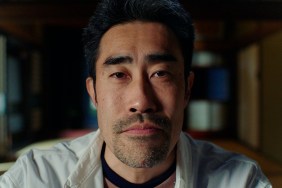It’s been seven years since we’ve seen Mel Gibson on the big screen, but he’s back in Warner Bros.’ new political thriller Edge of Darkness, which also stars Ray Winstone. Gibson plays a Boston cop who stumbles across a government and corporate cover-up while searching for the truth about his daughter’s brutal murder. At first he believes he is the target of the crime until he begins to unravel the secrets his daughter was keeping. The film is based on a British TV drama which first aired in 1985 and to this day remains one of the most influential miniseries in British TV history.
Gibson and Winstone not only talked about their latest project, but other upcoming films as well like Mad Max: Fury Road, Gibson’s untitled Viking movie and Steven Soderbergh’s Cleo:
Q: Have you gotten the acting bug back and might you pop up in “Mad Max 4”?
Mel Gibson: I walked away from it after “Signs” because I just felt I was a bit stale. It wasn’t ringing my bells so I focused on directing and writing and producing and all that kind of stuff, and it was time to come back. Now, I got the acting bug back because I felt like all of a sudden maybe after all these years I might have something to offer again and it coincided with a very good piece of material. It was a compelling story with good elements attached and I dug it, and it gave me the chance to work with Martin and Ray and Graham and Bill Monahan. If it wasn’t this, it would’ve been something else but this was the best thing that I saw.
Q: Have you talked to George Miller about “Mad Max”?
Gibson: Oh yeah, I’ve talked to George. We’ve had a good chin wag about it. We talk all the time anyway, George and I, so I’m abreast of that. I know he’s been trying to do this for years, the fourth installment. At one point I was involved and it felt a bit… so now it’s probably gone through a lot of changes. I can’t wait to see it because everything he does I think is magic, I think is a touch of genius, more than a touch of genius about George. Probably most of any good trick I’ve ever learned, I’ve learned off that guy and Peter Weir.
Q: Once you got back did you feel rusty or did it come back to you quickly?
Gibson: A little bit. I remember Martin had to tell me to tone it down a couple of times because you forget levels and stuff. It’s like sort of dialing in levels and stuff. So after that it was pretty natural. You don’t do something for 30 years and forget it. So yeah, it felt all right. It felt better actually.
Q: Do you keep in shape naturally or did you have to get back in shape for the fight scene?
Gibson: Well, the only thing I did with that was just I ordered a chiropractor for the day after because I knew what it was going to feel like. I knew I was going to wake up like road kill and I did. You don’t bounce back as quick as you used to, and that guy’s 25, right? And he’s taking it easy on you, okay. It’s not a pleasant experience, you know. Things, you don’t pop back the way you used to but it’s okay. So long as it still looks good.
Q: Did you watch the original because your performance was similar to Bob Peck’s?
Gibson: It was? Interesting because I watched it back in the ’80s, avidly. Avidly. It was some of the best TV I’d ever seen and British television at that time was great. We’ve all talked about that but I made a point to not watch it, because I didn’t want it to be a part of that. But to just try and be truthful. Hey, if you’re saying that my performance was anything like what Bob Peck did, I’m flattered because I think he was amazing.
Q: What were the most challenging scenes for you?
Gibson: Boy, challenging. Look, every time you go out there to do something, you wonder if you can do it. There’s no assured success. There’s no secret recipe for success. Every time you go out there, you go out there with the possibility of great failure. So the whole business of putting your wares on display, whether you’re a chef or an opera director or a painter or whatever, a filmmaker, whatever you happen to be, you’re throwing your stuff out there for other people and it’s going to be judged. You’re either going to be excoriated or praised or somewhere in between. Both sometimes. It’s all a challenge. The whole gig is a challenge.

Q: Why are you drawn to stories about characters that lose family and fight for justice?
Gibson: Ah, well, there’s a lot of anger around. That’s not a good answer either. I think that’s a very old theme in a lot of stories. Look at “Beowulf.”
Ray Winstone: Yeah, I think also you look at the script first. If you love the script, and it just happens to be about that subject, the subject is not the thing you look at first. It’s the script.
Gibson: It reminded us of a Jacobean tragedy from the 17th century in almost every way. By one of those guys like Turner. He wrote “The Revenger’s Tragedy.” They were all written by English guys about the Italians. It was really weird in the 17th century. “Man, those Italians are really vengeful. Look at how revengeful
” all talking about the other guy. So that’s what it reminded me of, where everybody gets it, even the dog. Even the dog gets it. So I don’t know, it’s an old theme and it’s part of most hero myths. Something sets the spheres a-wrong and somebody has to right it. It’s a big theme.
Q: You’ve been on the edge, defending projects, being the center of politics
has all that made you a better actor? And how did you quit smoking?
Gibson: What does not kill you makes you stronger and tougher I think. Life’s experiences, whether they be pleasant, unpleasant, torturous or excruciatingly wonderful and blissful, season you somehow and you learn from them. And hopefully we learn. Isn’t that what it’s about? That’s like all I’m trying to do now is put some information on a chip that I can leave to my progeny and maybe they can do a better job than I can in this crazy, spinning piece of dirt in the future. How did I quit smoking? It was torture. I’m on day nine now so it’s almost over. But the first three days I was like an axe murderer. Day four I’d come at you with a bat. Day five I was dangerous with a lawnmower. But it is a hellish habit to break. Your neurons are involved. My mother smoked I think when I was in her womb. I’m not sure. I think so. When I first had one when I was nine years old, I thought, “Oh my God, now, ahh, yes, I missed this.” I knew I missed it. Then 45 years later, after every single artistic decision, every decision I’ve ever made was done with a cigarette. To not have that is pretty hectic. That’s like worse than… that’s crawling the walls, I did for a while.
Q: Ray, how much fun was it to play this character?
Winstone: It’s funny because the parts you really want to play are the emotional parts. I do anyway, personally. To sit across the table or sit in the garden watching someone play the emotional part, when I read the script, and I didn’t have a lot of time to get my head together and with the help of Martin and Mel as well, decide which way you’re going to take it. To play a man really, me in the film, a man with no emotion who’s seen death and created death, I’ve kind of met people like that, years ago who’ve been through, whether it’s the second World War or people who were members of the SAS. They have these eyes that kind of burn into you and look at the wall behind you. You can’t tell them lies. Because of the amount of emotion that Mel has to go through in this film, it’s kind of making the decision. It’s all about decisions anyway as an actor, but to make a decision to play someone who had no emotion on the surface. Besides, going to work is fun anyway. Especially when you’re sitting opposite someone like Mel or John Hurt or whatever it is. It’s always a blessing because you’re working with people who are talented and know their job and know their business.
Q: How did you happen to learn to direct, and how do you dial back and take direction?
Gibson: Well, how do you learn to direct? I mean, you hang around the hub and watch what’s going on and ask a bunch of questions. You’re there for the inception of an idea, you’re there to see it executed. You’re there to doubt it, you’re there to see if they pull it off or not. You’re there to sort of share the fruits of the victory or failure so it’s like wow, it’s like a big science experiment for 30 years so how can you not pick it up and if you’re working with really good people, it’s just great. Let go of it? I don’t think you can ever totally let go of it. You can pull back on it and not get too forceful. I hope I wasn’t too hard on Martin [Campbell] here. I don’t think I was but occasionally I’d say, “Dude
” and I’d get an idea or something and you know what? A good director, if it’s a good idea, and I’ve noticed this, people come to my table when I’m directing and they have good ideas and I say, “That’s a god damn good idea. Can I steal that?” They go yes, please and you go okay, I’ll take it. He actually did swipe one of my ideas and that’s the earmark of a good director. When he sees a good idea, he takes it.

Q: Mel, what’s left that you want to accomplish?
Gibson: I’m working with Graham [King] here on the Viking movie. The very first idea I ever had about making a film and about ever my first thought of ever being a filmmaker was sixteen years old and I wanted to make a Viking movie. And I wanted to make it in Old Norse which I was studying at the time, okay. It’s odd because at that age, you’re like, “Well, that’s a stupidly ridiculous idea. How will I ever be a filmmaker? That’s a dumb idea. It’s just some kind of romantic pipe dream.” But that was the first big, epic, wacky idea was to show Viking real.
Winston: I thought you said a f***ing movie.
Gibson: It’s actually not very different. You get to see another country get f***ed.
Q: Does that mean the Viking movie will be in English or Old Norse?
Gibson: I think it’s going to be in English, the English that would’ve been spoken back then and Old Norse, whatever the ninth century had to offer. I’m going to give you real, man.
Q: Is that really important to you, like “The Passion”?
Gibson: Yeah, I want a Viking to scare you. I don’t want a Viking to say, “I’m gonna die with a sword in my hand.” I don’t want to hear that. It just takes all the… it pulls the rug out from under. I want to see somebody who I’ve never seen before speaking low, guttural German who scares the living sh*t out of you, coming up to my house. What is that like? What would that have been like?
Q: How hard will that be to cast, apart from Leo?
Gibson: Oh, he’ll be amazing. He’ll be amazing. He’s a great actor this kid.
Q: Are you a documentarian of the past?
Gibson: I guess so. I like that. I do like history. Oh, I love it and I like trying to imagine what it was like, especially if we don’t have a clear picture on what it was, trying to imagine what it was like. Maybe romanticize it, make it compelling for film. Maybe even push it a little over the top. It’s just a question of choices.
Q: You did a film with Jodie Foster, tell us about that.
Gibson: Yeah, “The Beaver.” As the title suggests, it’s about a guy who…
Winstone: Don’t go there.
Gibson: It’s like shooting cats in a barrel. It’s about a man who’s clinically depressed and circumstances somehow or other dictate that he finds himself with a ratty beaver hand puppet on his arm. He can’t even kill himself properly but he ends up with a beaver puppet talking and he manages to kind of save himself and his life and his family and everything by expressing himself through this hand puppet because that’s all he can do. He’s too far gone. He’s too broken.
Q: Were there humorous elements?
Gibson: Well, it sounds pretty bizarre but she’s a ballsy girl, you know. She was going for real.
Q: And you’re filming it currently?
Gibson: Oh no, we finished.
Q: What can you tell us about “How I Spent My Summer Vacation?”
Gibson: Oh that. That’ll happen in March probably. That’s something I wrote with a couple of the guys on “Apocalypto,” with the first and the second AD on “Apocalypto,” we sat down and wrote this story, “How I Spent My Summer Vacation,” about a gringo in a Mexican prison.
Q: Was there a point during your period off that you considered not coming back?
Gibson: Yeah, of course, yeah. Probably further toward the beginning and then as time went on, you think eh, maybe I should try again. You don’t know. That’s why I didn’t make some big pronouncement, “I am quitting, I’m retiring.” I didn’t want to do that but I just thought I’d back away for a while.

Q: Were you discouraged or tired?
Gibson: Just tired and bored with it, you know. I’ve done that a couple o’ times. I just walked away and just spent a year not doing it, do something else. I think it’s a natural thing. As soon as something starts getting a little tedious and you want to spice it up again, you kind of have to change it.
Q: Are you a protective dad in real life, and is it especially hard with daughters?
Gibson: Yeah, well, I think I am a protective dad. I’ve never really been in situations, fortunately, where the kids have been in some of harrowing dangerous experience. I related one the other day. It’s pretty basic. I remember I went to the pharmacy to buy some formula for my newly born twins. They’re now 27. I brought my 21-month-old to the pharmacy with me because my wife was occupied with twins. It was a place called Coogee in Australia. There was a pharmacy right on the corner and then there was the Coogee Bay road, really busy road. We had a karitane nurse from New Zealand at the time who used to help out during the day and go home at four. So it’s that time, we’re in the pharmacy, I’m buying formula and I take my eyes off the child for a second. The next thing, I look up, I’m saying, “Well, what’s the difference between this one and that?” I look up and I see my child standing about maybe 25 yards away on the edge of the curb and the karitane nurse in a bus stop on the other side with traffic blowing in front of her going [waving hands no]. She’s going out there to say hi to her. Well, okay. Okay. 25 yards and not much time to get the kid, okay. So needless to say, there’s an old man with broken ribs. There was a lady with a footprint on her face. I completely wrecked the place to get through that place and get the kid. I broke everything and ran through things and lifted things and threw them out of the way, that you weren’t supposed to do, to pluck her out before she got struck by a car. I forgot who asked me that question, so yeah, you’ll do anything for your kids, even kill somebody. [Laughs] But the poor woman, I had to apologize to a lot of people afterwards and they didn’t understand. They get very angry of course because you’ve knocked an old lady over.
Q: Have you learned anything exciting while you were recharging away from the industry?
Gibson: Well, I didn’t really get away from the industry. I learned a lot about the industry. I learned about writing. I learned about conceiving, from conception to writing, bringing that to the screen to sort of mounting a film to producing it to directing it to actually single-handedly marketing and distributing and doing everything except exhibition. And I think I did it. It’s almost kind of the full thing. Now I bought a bunch of theaters in Australia called the Dendy chain. So I’m an exhibitor as well.
Q: What made you come back then?
Gibson: To act again? It was just time. I don’t know. I just felt like doing it. It was my first love. I used to love doing it and if the tarnish is on it and the glow goes off it, you can kind of walk away for a while. When it’s time to come back, you come back.
Q: Is Steven Soderbergh’s “Cleo” still happening?
Winstone: I don’t know. It was going to go last year and I think Steven had another film to go and do. There was talk of it going this year but I haven’t heard anything more about it to be quite honest with you. It’d be great, dressing up in a toga and all that with Tony Curtis haircuts, singing rock ‘n’ roll.
Q: Would it have been you singing?
Winstone: What, do you want me to apologize for that? [Laughter] Yeah, and that’s another… from a kid, I always wanted to be a singer. My balls dropped one day and that was it. My daughter’s a singer. She sings jazz and blues but I’m a frustrated singer really. I think I became an actor because I couldn’t sing. You play a different kind of music now. I’d love to do that.
Q: It’s not officially dead?
Winstone: I haven’t been told it’s dead. I haven’t been told when it’s going but I’d love to. And to get a chance to kiss Catherine Zeta-Jones, so I’d love to do the film and I think he’s a very, very clever boy and I think if anyone can pull that off, he could.
Q: Mel, have you ruled out a cameo in “Mad Max”?
Gibson: No, no. We just talked.
Edge of Darkness opens in theaters on Friday, January 29th.

